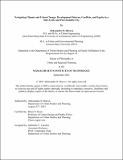Navigating Climate and Urban Change: Development Patterns, Conflicts, and Equity in a Sub-Arctic and Post-Socialist City
Author(s)
Durova, Aleksandra O.
DownloadThesis PDF (45.18Mb)
Advisor
Ryan, Brent D.
Terms of use
Metadata
Show full item recordAbstract
As climate change impacts on settlements escalate, cities strive to adapt and enhance resilience. However, as another form of urban restructuring, climate adaptation and resilience projects have inadequately addressed vulnerability and the risk of reproducing inequitable outcomes. Simultaneously, urbanization dynamics reshape cities, intensifying vulnerability through patterns of urban growth and housing and land development. This dissertation examines urban restructuring and its implications for equity, focusing on how and why residential development patterns shape uneven socio-spatial risk and vulnerability.
Centering its inquiry on Yakutsk (Russia), this dissertation merges the contexts of a sub-Arctic city at the forefront of climate change concerns and a post-Socialist city undergoing rapid urban change and associated landscape transformations. Drawing on historical perspectives on urbanization, this dissertation provides insights into the interplay between socialist legacies, their reconfigurations, and the reproduction of risk and vulnerability. This study engages with views of urban change as a conflict-laden process, placing socio-environmental transformations at its center. Adopting a constructivist grounded theory approach, this dissertation analyzes data collected through semi-structured interviews, a resident survey, and secondary sources.
By examining four distinct development patterns and citywide dynamics, this study reveals that socio-spatial vulnerability and risk are a product of development conflicts surrounding growth and housing and infrastructure provision. The state generates and mediates these growth, redevelopment, and infrastructure conflicts and reproduces risk and uneven vulnerability through different processes. These processes include facilitating risky land conversions, excluding certain areas from collective protection, shifting responsibility for protection onto households, infringing on development rights, and supporting displacement with insufficient compensation. The processes arise from governance dynamics, such as top-down technocratic planning aligned with market interests, inadequate consideration of risk in spatial development, and a lack of housing market regulation. The cases expose physical manifestations of socialist legacies and conflicts surrounding their transformations. Elements of state-led urbanism and recentralization of power, distinct from socialism but echoing the past, also contribute to vulnerability reproduction. The findings also highlight the need to reimagine planning approaches within traditional realms and climate adaptation aiming for more equitable transitions in urbanization.
Date issued
2023-09Department
Massachusetts Institute of Technology. Department of Urban Studies and PlanningPublisher
Massachusetts Institute of Technology